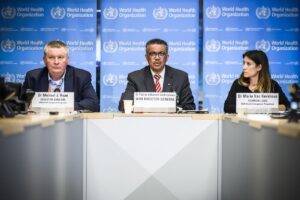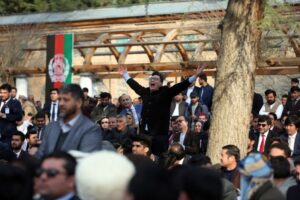
The National Interest Foundation Newsletter
Issue 36, March 12, 2020
Welcome to our latest edition of the NIF Newsletter. This week, we recap Tuesday’s NIF lunch discussion event regarding the newest developments in Idlib as we approach the 9th anniversary of the Syrian revolution.
Meanwhile, in our news headlines: the coronavirus outbreak grows in the United States and the WHO declares a global pandemic, former Vice President Biden extends his delegate lead over Senator Sanders as six more states cast their ballots in the presidential primaries, Saudi Arabia and Russia wage a price war over oil costs, and Afghanistan sees two rival presidential swearing-in ceremonies as the country’s talks with the Taliban loom.
NIF Event
The National Interest Foundation hosted a panel discussion on Tuesday, March 10th, to discuss the ongoing crisis in Syria’s Idlib province as the Syrian revolution nears its decade-long milestone. Speakers at the event were Hassan Hassan, Director of the Non-State Actors and Geopolitics program at the Center for Global Policy; Charles Lister, Senior Fellow and Director of the Countering Terrorism and Extremism program at the Middle East Institute; and Jennifer Cafarella, Research Director at the Institute for the Study of War. Moderating the panel was Hamdi Rifai, Executive Director at the Council of United Syrians and Americans.
Charles Lister began the discussion, and spoke about the latest developments in northwestern Syria, particularly in Idlib. According to Mr. Lister, the humanitarian crisis unfolding in Idlib is unprecedented in modern times, stretching back to the end of World War II. The United Nations has run out of the materials it needs to support civilians in Idlib, and the mass displacement of people within Syria is creating additional pressure on international organizations, to which they have few answers. Additionally, the United States and the United Kingdom have not raised the matter with the United Nations Security Council with the urgency the situation demands. The escalation by the Syrian regime in Idlib has also increased pressure on Turkey, which is battling Syrian government forces on the frontline of northwest Syria. Internal domestic sentiment in Turkey indicates the country is united in its unwillingness to accept additional Syrian refugees, having taken in over 3.5 million over the course of Syria’s revolution. Lister also spoke of Turkey’s recent military strategy in Idlib, and how it is designed to prevent additional humanitarian catastrophes and hundreds of thousands of refugees spilling over Turkey’s border.
Hassan Hassan spoke next on the dynamic of outside actors within Syria, and how those dynamics would shape Syria’s future. He began with Turkey, and how invested Turkey is in Syria. Turkey’s policy has been shaped by the lessons learned by the Iraq War, particularly in ensuring that is able to project influence into Syria. It is President Erdogan’s belief that by maintaining a military presence in Idlib, Turkey is ensuring it will be part of any eventual peace process and will have a say in the final outcomes of Syria’s revolution. The importance of Idlib to Turkey is also illustrated by its position in opposition to Russia, a country which it still enjoys good relations with. Hassan also spoke of Iran’s influence in Syria, and predicted that Iran and Turkey will become adversaries in the near future due to their competing interests in Syria. Iran’s influence in Syria has also declined as a result of the Assad regime receiving support from Russia, which has lessened its dependence on Iran.
Concluding the panel, Jennifer Cafarella spoke about the United States’ policy in northwestern Syria. To begin, she emphasized that despite the Syrian revolution being a near decade-long conflict, it is not yet close to a conclusion. She also criticized the U.S. for not having formulated a coherent policy toward Syria yet, but praised the decision to keep some American forces in northwest Syria defending oilfields. Ms. Cafarella stressed the importance of the United States re-engaging in Syria, and formulating a plan to facilitate stability in Syria in the coming years. She also warned that without a re-engagement, it is likely that ISIS would resurface and attempt to recapture territory from the Syrian regime. She concluded by praising Turkey’s efforts in Idlib as being part of a larger policy toward Syria that is coordinated effectively, and saying that the United States should work with Turkey toward a common goal to restore peace and stability in Syria.
To watch the entire event, please click here.
News Headlines
Growth of the Coronavirus Outbreak

On Wednesday, the WHO announced that the coronavirus has been found on every continent except for Antarctica. (Photo from Getty Images)
WHO Declares Coronavirus Outbreak a Global Pandemic
Over the past week, the coronavirus outbreak has grown worldwide, prompting the World Health Organization (WHO) to declare it as a global pandemic. Here in the United States, more than 1,000 people have now been diagnosed with the virus, and government officials across the country have begun to enact measures to try and contain the spread of it. Last night, President Trump announced that he would be banning most foreign travelers from Europe for the next 30 days, effective Friday at midnight. These restrictions apply only to foreign nationals, and not U.S. citizens, green card holders, or the families of U.S. citizens. Additionally, the U.S. House of Representatives is slated to take up a bill which would provide several coronavirus relief measures including free testing, paid emergency leave, and food security assistance.
Super Tuesday II

Biden followed last Tuesday’s strong election night performance with another one this week as well. (Photo from Getty Images)
Biden Extends His Pledged Delegate Lead over Sanders
Former Vice President Joe Biden had another strong election night showing on Tuesday and extended his pledged delegate lead over Senator Bernie Sanders in the race for the Democratic presidential nomination. This week’s contests saw six more states cast their ballots in the presidential primaries. Biden was declared the winner in Michigan, Missouri, Mississippi, and Idaho, while Sanders won in North Dakota. The election in the state of Washington is still too close to call for either candidate at this point. Next, the two frontrunners are scheduled to debate in Washington D.C. this Sunday, March 15th, however there will be no live audience due to concerns over the coronavirus outbreak. The debate will come two days before the March 17th primary elections in Arizona, Florida, Illinois, and Ohio.
Oil Price War

Saudi Arabia and Russia have ignited a price war over oil exports. (Photo from Getty Images)
Saudi Arabia and Russia Wage a Price War over Oil Costs
Saudi Arabia has initiated a price war on oil exports, after Russia rejected a proposal from its OPEC partners to cut supply. The oil conglomerate OPEC was attempting to slash its supply of crude oil by 1.5 million barrels per day, to prop up prices amid uncertainty from the coronavirus. Russia rejected this proposition, sensing that it could profit off of the world economy’s downward trend. In retaliation, Saudi Arabia cut its oil exporting price by roughly 10% in order to undercut Russian prices. The effect of the price war is already beginning to have a significant impact on the world’s oil market, with prices in the United States alone reaching a four-year low.
Rival Swearing-In Ceremonies

Afghanistan’s domestic peace talks have been hit by a political crisis. (Photo from AP)
Rival Presidential Swearing-In Ceremonies in Afghanistan
As talks with the Taliban loom for Afghanistan’s government, the country finds itself in political disarray as two people are sworn in as president. After holding an election nearly five months ago, Afghanistan’s electoral commission declared Ashraf Ghani the victor last month, awarding him just over 50% of the votes, enough to avoid a run-off. Ghani is the current incumbent, and his rival, Abdullah Abdullah, declared the results a sham, and himself the victor. Abdullah claimed that Ghani had received “illegal” votes, and the result was “national treason.” Accordingly, Abdullah has been proceeding as though he won the election, and held his own swearing-in ceremony simultaneously with Ghani’s. The timing of the dispute could not be worse for Afghanistan, as all-Afghan peace talks loom as part of the negotiations to see the United States pull out of Afghanistan.
Enter the text or HTML code here
